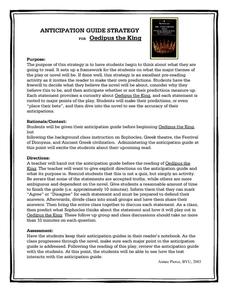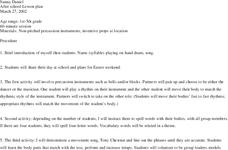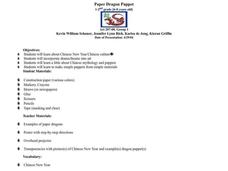National Endowment for the Humanities
Vengeful Verbs in Shakespeare’s “Hamlet”
It's time for pupils to read, examine, and contemplate literature to explore the difference between vivid and generic verbs. Pupils distinguish between the two types of verbs as they read the ghost scene from Shakespeare's Hamlet. They...
Curated OER
A High-Interest Novel Helps Struggling Readers Confront Bullying in Schools
Bully, bullied, or bystander? Paul Langan's The Bully is the anchor text in a unit that examines bullying and violence. After a close reading of the text, readers imagine themselves as the characters and consider how they would react in...
Read Theory
Analogies 3 (Level 7)
Master word analogies with a straightforward exercise. Pupils match word pairs to one another based on the relationships represented in each pair. The learning exercise provides bridge sentences that learners fill out as...
Novelinks
Oedipus the King: Anticipation Guide
Is it possible to escape fate? Are all types of pride evil? Are family secrets best kept secret? Before reading Oedipus the King, class members respond to a series of statements on an anticipation guide that introduces some of the basic...
Prestwick House
Poe’s “The Raven” – Unity of Effect
How do Poe's choices of imagery, rhythm and rhyme scheme, and structure help build the desired single effect of "The Raven"? After listening to a dramatic reading of the poem, class members consider whether Poe's choices do...
Prestwick House
A Raisin in the Sun
Or does it explode? Discuss the ultimate deferred dream in Lorraine Hansberry's A Raisin in the Sun with a handy crossword puzzle that reviews key names and details from the play.
Brigham Young University
Introducing the Text and Learning the Process of Script Analysis
Where do directors and set designers get their ideas so that the set they build creates the mood and atmosphere the director wants for a production? From the script! Introduce theater high schoolers to the script analysis techniques used...
Brigham Young University
Understanding the Research Process
The second lesson in a unit on set design focuses on the importance of historical and stylistic research. Working in teams created in the previous session, groups consider what resources they will use as they consider design concepts for...
Brigham Young University
Understanding Design, Composition, and Color
The set for a play combines design elements (style, line, shape, mass, measure, position, color, and texture) and principles of composition (unity, harmony, contrast, variation, balance, proportion, and emphasis) to create a particular...
Brigham Young University
Creating a Design Concept
Putting together information gained from their script analysis, their readings, and their research, groups create a conceptual design statement for their assigned scene. The statement explains how their scenic design creates the mood and...
Brigham Young University
To-Scale Models
Guided by their analysis of a scene, their initial sketches, and renderings, set designers begin to craft a scaled, 3-D model of the set of the play they have chosen.
Brigham Young University
It's All in the Details
Designers communicate their vision for a set through a progression from thumbnail sketches, to drawings, to renderings. After examining a series of renderings, class members begin work on their own rendering paying particular attention...
Brigham Young University
Problems? Working it Out
Working in pairs, set designers take turns sharing their sketches, explaining how their renderings articulate their concept, and receiving feedback on concerns and questions.
North Carolina Consortium for Middle East Studies
Using Drama to Address Social Justice Issues in School and the Community
Artists, musicians, and dramatists have long been the leaders in the quest for social justice. To gain an understanding of the power of the arts to address social issues, class members listen to a reading of Drew Daywalt's The Day the...
Curated OER
Movement
Students experiment and explore a variety of instruments and movements. They play rhythms on instruments, spell words using their bodies, act out the movements of a song, role-play machine parts as a group, pantomime an activity, and...
Curated OER
Paper Dragon Puppet
Students discuss the Chinese New Year and the importance of the dragon in Chinese culture. After examining pictures of dragon puppets, students create simple dragon puppets and have their own Chinese New Year parade.
Curated OER
Square Dancing
Fourth graders investigate the concept of using punnett squares in the determination of the offspring.They collect drawings and pictures and create a collection for student science journals.
Curated OER
A Jazz Talk Show
Learners analyze and describe music while connecting it to history and culture. They gain experience in theatre arts skills and writing. They use the Internet to do research in order to find out the most about this subject.
Curated OER
Creating Nonviolence: A Theatre of the Oppressed Approach to Things Fall Apart
Eleventh graders analyze Ahimsa and complete activities for nonviolence. In this nonviolence lesson, 11th graders define violence and relate it to their lives. Students adapt prose into a dialogue to act out and analyze the violence in...
Curated OER
Chicago On Stage
Students view a film about the genres and disciplines of performing arts. They examine the theatre community in Chicago and the origins of theatre companies. They answer questions and discuss them to end the lesson.
Curated OER
Colors of Gray
Students view a film about theatres in Chicago. They discover how performing arts can be enjoyed by all ages and how one becomes involved in performing in theatre. They answer questions and discuss to end the instructional activity.
Curated OER
A Study of "Twilight Crane" by Kinoshita Junji
Learners read and analyze the Japanese play, "Twilight Crane," by Kinoshita Junji. They read a handout on Japanese theatre, conduct Internet research, answer discussion questions, and compare/contrast versions of the story.
Curated OER
When Shall We Three Meet Again?
Double, double toil and trouble; Fire burn, and caldron bubble. Macbeth’s witches provide young actors an opportunity to try their hand at small ensemble acting. Using Act I, scene I of Shakespeare’s play, groups of three take...
Curated OER
Mythology: Reader's Theater
Build reading fluency and classroom community with a Reader’s Theater activity. Class groups select a myth, or if part of a myth writing unit, select a group member’s myth, craft a script, and perform for the class. Directions for...
Other popular searches
- Theatre Arts Lighting
- Introduction to Theatre Arts
- Theatre Arts Projects
- Theatre Arts Games
- Theatre Arts First Grade
- Theatre Arts Jobs
- Theatre Arts Lesson Plans
- Theatre Arts Production Team
- Theatre Arts and Butterflies
- Theatre Arts Lessons
- Language Arts Readers Theatre

























